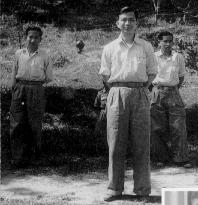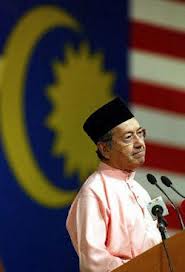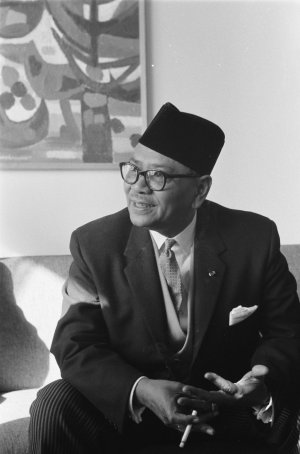
During
World War II, Chin Peng and the British Army (Force 136) joined forces
in 1941, to fight the Japanese invaders. Chin Peng’s outfit was called
the Malayan People’s Anti-Japanese Army (MPAJA) and after the war, he
was decorated for his heroism with the Order of the British Empire (OBE)
by His Majesty King George VI.
by Mariam Mokhtar @http://www.malaysiakini.com
 The
Malaysian government intended to deliver a humiliating blow and final
insult to Chin Peng, the late former Secretary-General of the Communist
Party of Malaya (CPM), by denying his dying wish.
The
Malaysian government intended to deliver a humiliating blow and final
insult to Chin Peng, the late former Secretary-General of the Communist
Party of Malaya (CPM), by denying his dying wish.
Despite
the sabre rattling by Premier Najib Abdul Razak and extremist groups
like Perkasa, it is Chin Peng who has won the psychological battle and
more importantly, is having the last laugh from beyond the grave,
leaving Najib with egg on his face.
Najib
may wish to diminish Chin Peng’s role in our history, perhaps even
airbrush him out of the struggle for Independence, but the irony is that
his death on September 16, will mean that the Malaysia Day
celebrations, will now also commemorate Chin Peng’s memory.
Chin
Peng has been praised for being a wily operator and the brains behind
the guerrilla warfare of the Emergency (1948-1960). Even he could not
have planned it better. His death on Malaysia Day was the ultimate
accolade for a man who was denied his right to return to the country of
his birth and denied a fair hearing in the Court of Appeal. What poetic
justice!
The Malaysian government reneged on the terms of the three-way Peace Treaty  which it signed with Thailand and the CPM leaders, in Hadyai in 1989. The PM at the time was (Tun) Dr Mahathir Mohamad (right).
which it signed with Thailand and the CPM leaders, in Hadyai in 1989. The PM at the time was (Tun) Dr Mahathir Mohamad (right).
 which it signed with Thailand and the CPM leaders, in Hadyai in 1989. The PM at the time was (Tun) Dr Mahathir Mohamad (right).
which it signed with Thailand and the CPM leaders, in Hadyai in 1989. The PM at the time was (Tun) Dr Mahathir Mohamad (right).
In
life, the government rejected Chin Peng’s application to live in
Malaysia. In death, they refused to allow his remains be interred in his
family burial plot near Lumut. This prolonged revenge-fuelled
retribution by UMNO Baru will unwittingly give Chin Peng, the oxygen of
publicity. If the young and uninformed did not know of Chin Peng, they
do now.
When Najib ordered that government forces be placed on red alert at border checkpoints, people scoffed at his idea.
If
two jet engines can be smuggled out of Malaysia, then it would be
child’s play to smuggle an urn into the country. This is a pointless
exercise especially as resources and manpower should be deployed to
better use, to deter crime.
Fighting
and living in the shadows were Chin Peng’s speciality. It would have
been easy for him to sneak across the border, assume an alias, and live
anywhere in the country, like the former Bosnian Serb leader, Radovan
Karadic, the architect of the Srebrenica massacre who escaped arrest for
12 years, practising as a doctor in Belgrade. Chin Peng may have been
the leader of a disbanded guerrilla army, but he was a man of honour.
The
unprecedented furore and lack of compassion, to allow an old man his
dying wish, is prompted by the upcoming UMNO-Baru elections. Najib will
milk Chin Peng’s death for political mileage to show his ultra-Malay
credentials.
Many people are probably unaware that the struggle for Malaya’s Independence was fought on several fronts.
When
the Japanese invaded Malaya in 1941, the Malays and Indians were given
better treatment than the Chinese. Sino-Japanese relations had
deteriorated after the Nanking Massacre (The Rape of Nanking) in 1937.
When
the tide turned against the Japanese in 1943, the Japanese started to
encourage Malay nationalism by arranging conferences, demonstrations,
language courses and education. They even whipped up anti-Chinese
sentiment by using paramilitary groups of, mainly, Malay men, to fight
Chinese resistance groups.
Without the CPM ...
In
the chaos immediately after the war, the MPAJA being the most organised
and well-armed group within Malaya was given tacit approval by the
British to restore law and order, at least until the British
administrators returned in force.
The
MPAJA used this opportunity to exact retribution on their old enemies
and Japanese collaborators. As the Malays had been given preferential
treatment by the Japanese during WWII, the MPAJA punished them severely.
The
clashes were interpreted as racial conflict. The Malays retaliated by
forming groups to fight what they saw as the “Chinese MPAJA/CPM”.
Internecine clashes between these two groups, continue to this day and
to increase the distrust between the Malays and Chinese, UMNO Baru will
conveniently use the bogey, ”Chinese communists” or “May 13”, whenever
it suits them.
After
WWII, Chin Peng continued his armed struggle for Independence, but this
time, he fought against the British because he wanted Malaya to be free
from colonial rule. He renamed his outfit, the Malayan Races Liberation
Army (MRLA). His ideology was to have an egalitarian society with the
wealth redistributed among the people equitably through the labour
movement under communism.
The
civilian side of the MRLA was the Min Yuen (Masses Movement) which
provided the guerrillas with food, information, and new recruits.
Civilians who did not cooperate were tortured by the MRLA, whilst those
caught cooperating, were imprisoned by the British.
The
guerrillas would disrupt labour relations on the rubber estates and
their sympathisers would demand military protection. The idea was to
sabotage the economy but also to keep the British troops out of the
jungle. The communists later changed this strategy when civilians began
to blame the communists for their hardships.
Najib
said that returning Chin Peng’s ashes would upset the Malays because
the CPM had committed atrocities against them. Malaya was on a war
footing. Atrocities were committed on both sides.
 The
Japanese killed several hundred thousand Malayans during the Japanese
Occupation; the Batang Kali massacre was blamed on rogue elements in the
British Army; and yet, the worse treatment has been reserved for Chin
Peng, whose forces were responsible for 10,000 deaths.
The
Japanese killed several hundred thousand Malayans during the Japanese
Occupation; the Batang Kali massacre was blamed on rogue elements in the
British Army; and yet, the worse treatment has been reserved for Chin
Peng, whose forces were responsible for 10,000 deaths.
No
one is condoning Chin Peng’s guerrilla warfare but Malaysians must
realise that without the CPM, the Japanese in Malaya would not have been
defeated.
Without
the Min Yuen, we would not have the current identity card system and
Chinese squatters living on the jungle verges would not have been
resettled into new villages, much to the irritation of Malay villagers
who complained that these settlements had electricity and running water.
Without
the CPM, we would not have had the Internal Security Act or a return to
the authoritarian regime of Gen. Sir Gerald Templer, the High
Commissioner who introduced local elections and village councils as his
objective was the formation of a united Malayan nation. The Chinese were
urbanised by the British to reduce the influence of the CPM.
UMNO
Baru and the Malays are in their exalted position because of Chin Peng.
Without the armed conflict of the CPM, the British would not have
agreed to give Independence to Malaya, nor the privileges that the
Malays now enjoy.
 Tunku Abdul Rahman (left) acknowledged
that Chin Peng’s challenge to him, at the Baling talks in 1955,
immediately led to Merdeka. Perhaps, it is fitting that divine
intervention has made it possible for UMNO Baru to honour Chin Peng
every year on September 16.
Tunku Abdul Rahman (left) acknowledged
that Chin Peng’s challenge to him, at the Baling talks in 1955,
immediately led to Merdeka. Perhaps, it is fitting that divine
intervention has made it possible for UMNO Baru to honour Chin Peng
every year on September 16.
The
British used the divide-and-rule strategy to conquer the locals, the
Japanese in WWII deployed the same tactic. Today, UMNO-Baru continues
this method of control.
Chin Peng may be gone but his legacy continues. Malaysians are still striving to establish a just and equal society.
Get your FREE website here --->http://www.pluginprofitsite.com/main-37067



No comments:
Post a Comment